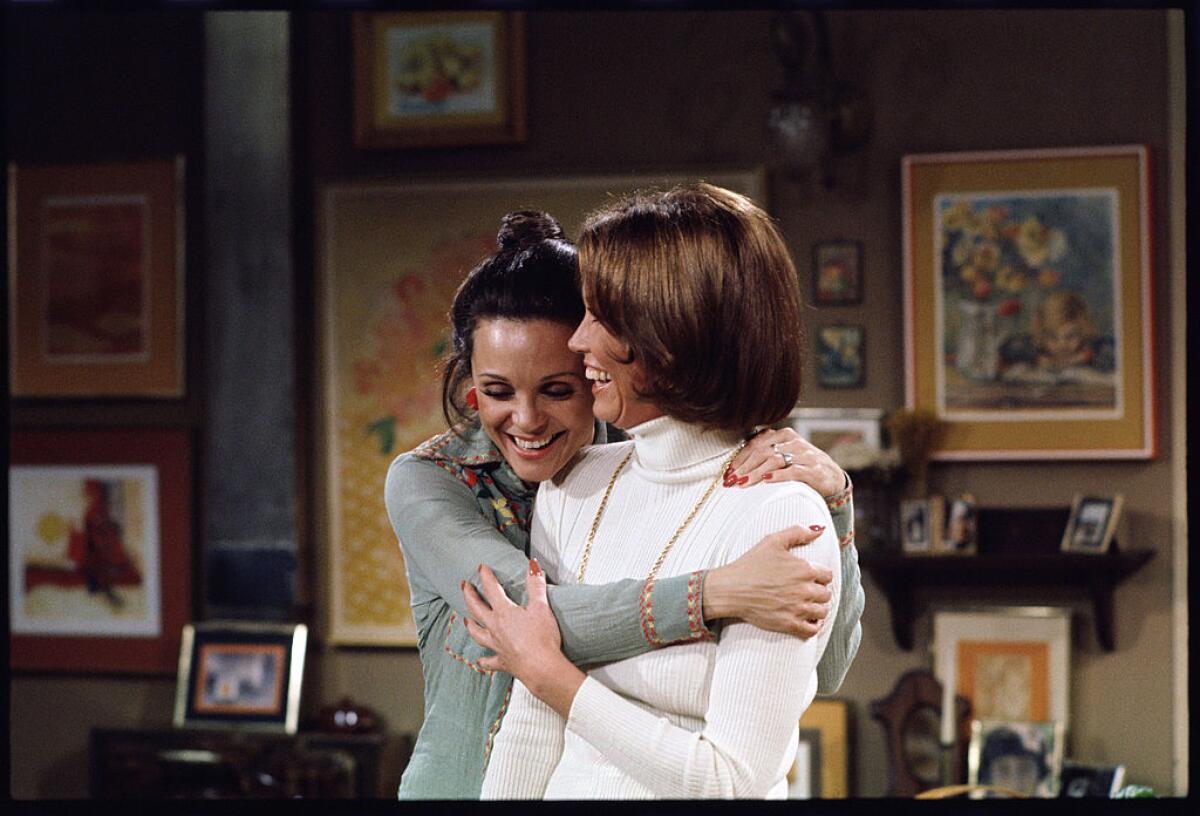Calendar Feedback: Valerie Harper was everyone’s friend

Appreciating the girl next door
Regarding Valerie Harper appreciations by Mary McNamara [“Rhoda? Always Coolest Person in Room,” Sept. 2] and Robert Lloyd [“Valerie Harper Made Sidekick a Star,” Sept. 3]: In the television history of sisterhood, Lucy had Ethel, Laverne had Shirley, Cagney had Lacey and Mary had Rhoda.
This select group of wonderful and creative actresses were always able to convey to all of us the meaning of genuine friendship, kindness and, most important, love. Valerie Harper was Rhoda and Rhoda was Valerie Harper. She was the kind of funny and genuine girlfriend we all got to share and cherish and hoped we would be in return to our girlfriends, in the real world.
Frances Terrell Lippman
Sherman Oaks
Hollywood is getting real
Regarding Mary McNamara’s column [“They Do Not Reflect the Real U.S.,” Aug. 29]: While I could not agree more about the misuse of the term “real Americans,” I would submit that your judgments of Hollywood may be a bit harsh. I’m not much of a fan of mainstream TV, but it seems to me that there’s a reasonable (and growing) population of programming featuring people of color as well as strong female characters, Showtime’s “On Becoming a God in Central Florida” is one worthy example. It may well be that certain of the groups you list are underrepresented but, compared to only a few years ago, significant strides have been made.
And from my personal, behind-the-camera perspective, I’m seeing an increasing number of women and people of color at work on sets and in production offices.
One notable example in this regard is “Atlanta,” where large numbers of young men and women of color are being integrated into all aspects of the industry, a terrific development for both the state of Georgia and the industry.
Jeff Denker
Malibu
::
Go back to a simpler time, the ’70s, oh yes, those were the days when Norman Lear produced wonderful shows that dealt with subjects no one wanted to talk about. His inclusion was not contrived, it was not the thing to do, just the opposite in fact. It made sense and it was important at the time as it still is today.
Hollywood should take a page from his book and bring back shows like “The Golden Girls,” a much-needed group of women who are highly excluded in Hollywood today.
Sherry Davis
Playa Vista
::
I had a good laugh reading Mary McNamara’s column “They Do Not Reflect the Real U.S.” She seems to think Hollywood has some moral obligation to right the wrongs of society. Her naivety would be charming if she weren’t a Hollywood Critic.
It’s called “Show Business,” not “Show Art” or “Show Morality.” As an artist who struggled to make a living for 30 years in “Show Business” I survived because I understood that the bottom line is what drives Hollywood. Always has. Always will. And Hollywood, despite being an inherently risky business, has always been risk-averse.
Tony Blake
Woodland Hills
::
Mary McNamara posits that Hollywood should produce more films and TV shows that center on minorities, women and LGBTQ people, even if that shift doesn’t immediately prove financially successful.
She’s right: Art should imitate life, to include portrayals of lives of untold millions who seem ignored if not disdained by bigoted political leaders. And with more minority, female and LGBTQ roles in films and TV shows, we can hope that life will imitate art, so as to eradicate invidious discrimination.
Rona Dolgin
Los Angeles
::
As I glanced at the dark and moody lead photo in Thursday’s Calendar from the new feature “Ad Astra,” I said to myself, wow, cool, a movie about a black astronaut. Then I looked closer and saw it was just an underlit Brad Pitt. I then immediately read Mary McNamara’s adjacent piece on under-representation in Hollywood, and it summed up my feelings perfectly. Nice layout.
R.C. Price
San Clemente
Defending Brando on Jacko
Regarding Christie D’Zurilla’s online story: “Marlon Brando Made Michael Jackson Cry. The Topic: Sexuality” [Aug. 29]: I was friends with Michael Jackson for over 27 years and my father adored him. I don’t appreciate my father’s words being twisted to imply that Michael hurt anyone.
This is just someone’s cheap publicity stunt to promote their paid podcast.
My father would never have been friends with Michael if he thought he was capable of doing harm to kids, and he would never imply anything negative about Michael.
Miko Brando
Beverly Hills
Stereotyping Shelley
Regarding Philip Brandes’ theater review [“Humanity Pulses Through ‘Frankenstein’” Aug. 28]: In claiming that A Noise Within’s production of “Frankenstein” “rescues Mary Shelley’s creation from the stereotype of innumerable grunting, lumbering movie monsters,” Philip Brandes is himself guilty of stereotyping, particularly if among his “innumerable” monsters he includes the most famous of all.
Boris Karloff caused a sensation and became an overnight star in James Whale’s 1931 “Frankenstein” because actor and director, with powerful sensitivity, revealed the humanity in Mary Shelley’s inarticulate, tormented creature. They continued to explore the author’s conception of the monster in “Bride of Frankenstein” (1935), wherein Elsa Lanchester portrayed both Mary Shelley herself and the title character who rejects the lonely monster’s advances.
If, as Brandes says, A Noise Within’s play “illuminates” Mary Shelley’s vision, it is not because it rescues her work from the first “Frankenstein” films but because it carries on the tradition they started.
Preston Neal Jones
Hollywood
There is nothing funny about Hitler
I am glad I read Glenn Whipp‘s sneak [“The Provocateur: Making Hitler Humorous,” Sept. 1] of an impending humorous Hitler movie (“Jojo Rabbit”).
I’ll be sure to miss it.
Craig Carr
West Hills
Is this the best LACMA can do?
Regarding “LACMA, Just Admit You Are a Ghost Town” [Aug. 24]: How come the Philadelphia Museum of Art could get Frank Gehry to redesign, update and expand the gallery space in that institution, and this is the best Los Angeles County could do? L.A. should be embarrassed.
Joel Gardner
Cherry Hill, N.J.
More to Read
The biggest entertainment stories
Get our big stories about Hollywood, film, television, music, arts, culture and more right in your inbox as soon as they publish.
You may occasionally receive promotional content from the Los Angeles Times.






